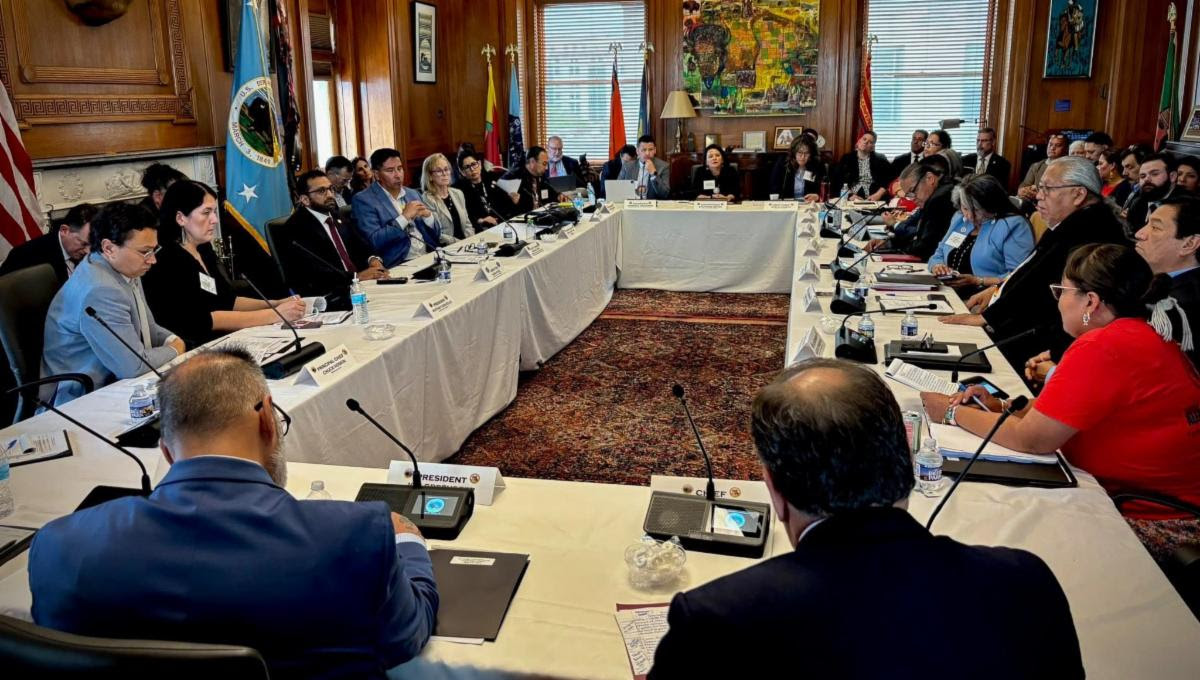
- Details
- By Levi Rickert
During a roundtable discussion on Monday, May 5 – National MMIP Awareness Day – with FBI Director Kash Patel, Navajo Nation Council Speaker Crystalyne Curley urged federal officials to provide greater support and resources to address the ongoing crisis of missing and murdered persons in the Navajo Nation.
Speaker Curley wore a shirt featuring a photo of 11-year-old Ashlynne Mike, a Navajo girl who went missing in 2016 and was later found deceased. The shirt had been given to her by Ashlynne’s family during a memorial walk held in her honor the previous Friday.
“Today is missing and murdered Indigenous peoples day,and I wear this shirt to honor the memory of a precious child, Ashlynne Mike, whose life was taken. Sadly, it is a case that could’ve been prevented,” Speaker Curley said.
Before the roundtable discussion, Speaker Crystalyne Curley collaborated with Council Delegate Amber Kanazbah Crotty and the Navajo Nation Washington Office to identify key federal policies in need of stronger support, including the Not Invisible Act.
Enacted in October 2020, the Not Invisible Act established a cross-jurisdictional advisory body known as the Not Invisible Act Commission. The commission includes federal and non-federal members such as law enforcement officials, tribal leaders, service providers, federal partners, family members of missing and murdered individuals, and survivors.
In 2023, Speaker Curley and Delegate Crotty submitted formal recommendations to the U.S. Department of the Interior, offering guidance for Congress and federal agencies on how to more effectively address the crisis of missing and murdered Indigenous people and human trafficking.
“We call on the Trump Administration and the FBI to uphold and fully implement the Not Invisible Act, and include the recommendations of tribes,” Speaker Curley stated. “The Navajo Nation currently has 68 missing persons. We need more law enforcement, criminal investigators, and medical examiners.”
Speaker Curley also emphasized the urgent need for increased federal funding to support DNA testing in missing and murdered persons cases, as well as resources for rapid response teams that can act quickly when individuals are reported missing.
The roundtable took place during the U.S. Department of the Interior Secretary’s Tribal Advisory Committee (STAC) meeting, led by U.S. Secretary of the Interior Doug Burgum.
Established in 2021, the STAC was created to ensure tribal leaders have consistent, direct communication with federal officials, enabling meaningful dialogue on intergovernmental responsibilities, information sharing, and guidance on Departmental programs and funding.
More Stories Like This
Native News Weekly (August 25, 2024): D.C. BriefsNavajo Nation Mourns the Passing of Former Vice President Rex Lee Jim
Deb Haaland Earns Endorsement From Communications Workers of America Local 7076
University Soccer Standout Leads by Example
Two Native Americans Named to Democratic Congressional Campaign Committee's“Red to Blue” Program
Help us defend tribal sovereignty.
At Native News Online, our mission is rooted in telling the stories that strengthen sovereignty and uplift Indigenous voices — not just at year’s end, but every single day.
Because of your generosity last year, we were able to keep our reporters on the ground in tribal communities, at national gatherings and in the halls of Congress — covering the issues that matter most to Indian Country: sovereignty, culture, education, health and economic opportunity.
That support sustained us through a tough year in 2025. Now, as we look to the year ahead, we need your help right now to ensure warrior journalism remains strong — reporting that defends tribal sovereignty, amplifies Native truth, and holds power accountable.
 The stakes couldn't be higher. Your support keeps Native voices heard, Native stories told and Native sovereignty defended.
The stakes couldn't be higher. Your support keeps Native voices heard, Native stories told and Native sovereignty defended.
Stand with Warrior Journalism today.
Levi Rickert (Potawatomi), Editor & Publisher


